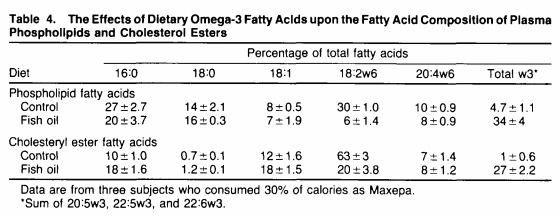I found this research paper (pdf) by D. Roger Illingworth, William S. Harris, and William E. Connor (Journal of the American Heart Association, 1984) that offers some help. Its abstract says:
Diets rich in omega-3 fatty acids derived from fish oils lower the plasma concentrations
of low density lipoproteins (LDL) and very low density lipoproteins in humans. The present study was designed to examine the mechanism(s) by which diets enriched in omega-3 fatty acids reduce plasma LDL cholesterol levels in normal subjects.
In the Dicussion part, you will find your answer:
Reductions in the plasma concentrations of LDL in human subjects consuming diets rich in long-chain omega-3 fatty acids from fish oils or omega-6 fatty acids from vegetable oils may be due to a reduction in LDL synthesis, an increased fractional rate of catabolism of LDL, or a combination of both... The present study indicates that the hypocholesterolemic effects of long-chain omega-3 fatty acids present in fish oils results from a reduction in the rate of LDL apoprotein B synthesis and that such oils do not stimulate the fractional rate of catabolism of LDL. These observations imply that the incorporation of omega-3 fatty acids into cellular or lipoprotein lipids does not enhance the rate of receptor-mediated catabolism of LDL as has been observed with omega-6 fatty acids in vitro.

I could not find a paper on its exact mechanism, so I'd rather say that the process is still not clear. Yet, as the paper suggests, the main effects of omega-3 fatty acids are reducing LDL synthesis and/or increasing fractional rate of catabolism (FRC) of LDL.
A similar article can be found here:
Omega-3 fatty acids have been shown to lower triglycerides, which are a type of fat in the bloodstream. Experts aren't sure of the exact mechanism. Omega-3 fatty acids may also slow down the growth of plaques in the arteries and reduce inflammation throughout the body.
A number of studies going back years have shown the benefits of fatty fish. In an important review of studies, researchers found that getting daily omega-3 fatty acids from fish oil could lower triglyceride levels by 25%-30%. The results were published in The American Journal of Clinical Nutrition in 1997.
BUT, I would also like to point out that the question itself "omega-3 fatty acids found in fish are a good way to prevent/reduce cholesterol problems" seems to be a matter of debate because of articles like this:
New data presented this week provide clues as to why eicosapentaenoic acid (EPA) and docosahexaenoic acid (DHA)--both components of omega-3 fatty acids--have differential effects on LDL cholesterol.
Presenting the results of the laboratory study here at the National Lipid Association (NLA) 2011 Scientific Sessions, senior investigator Dr Preston Mason (Brigham and Women's Hospital, Boston, MA) said that EPA is an inhibitor of lipid oxidation at normal and elevated cholesterol levels in the presence and absence of DHA, while DHA seems to have no real effect on lipid peroxidation. This trial was one of a number of studies that attempted to address the clinical question as to why LDL-cholesterol levels increase in patients treated with the triglyceride-lowering omega-3 fatty acids. In his trial, Mason et al compared the effects of EPA and DHA--alone or in combination with statins--on lipid peroxidation in polyunsaturated fatty-acid– and cholesterol-enriched vesicles.

